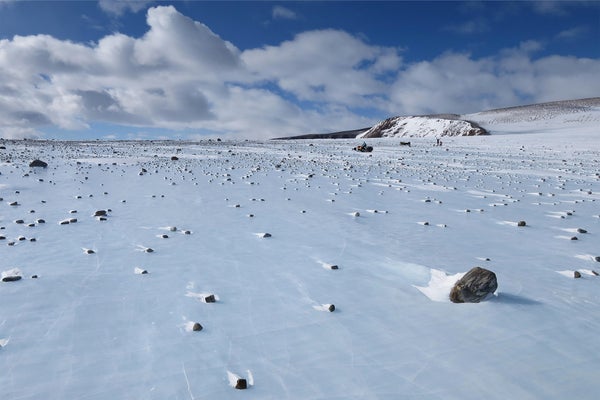Meteorites in Antarctica Are Getting Harder to Find because of Climate Change
As climate change warms the poles, precious Antarctic meteorites will melt their way down out of scientists’ reach
Meteorites are widely scattered across a moraine on the blue ice field in the Miller Range on December 19, 2015 in Antarctica.
NASA Photo/Alamy Stock Photo
Climate change has pernicious impacts on Earth, affecting everything from the atmosphere to ice sheets and from algae to elephants. But even rocks from space aren’t immune to warming-weather-related upheavals either.
Meteorites are fragments of other worlds that survive whizzing through Earth’s atmosphere to land as dull, scorched-black rocks. For decades, planetary scientists have used meteorites to better understand the distant places they come from, and Antarctica has been a particularly valuable source, supplying more than 60 percent of those collected to date. But the bounty may be disappearing, according to research published on April 8 in the journal Nature Climate Change. In it, scientists estimate that we’re already losing Antarctic meteorites faster than we collect them—and that the rate of loss will increase as the planet continues to warm, with the rocks sinking deep in the ice sheets, out of scientists’ reach.
Although scientists have collected some 80,000 meteorites to date, there’s no telling which ones will reveal something new. “Usually, a few of the meteorites that are brought back every season are something we’ve never seen before,” says Cari Corrigan, a geologist and curator of the Antarctic meteorite collection at the National Museum of Natural History in Washington, D.C., who peer-reviewed the new paper but wasn’t directly involved in the research. “Each one is kind of a piece of a puzzle that helps us understand how the whole solar system formed.”
On supporting science journalism
If you’re enjoying this article, consider supporting our award-winning journalism…
Read the full article here







